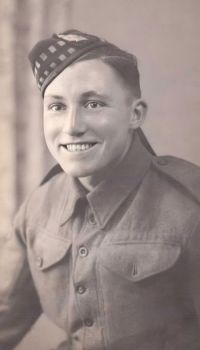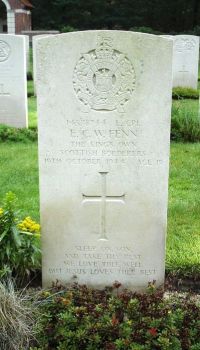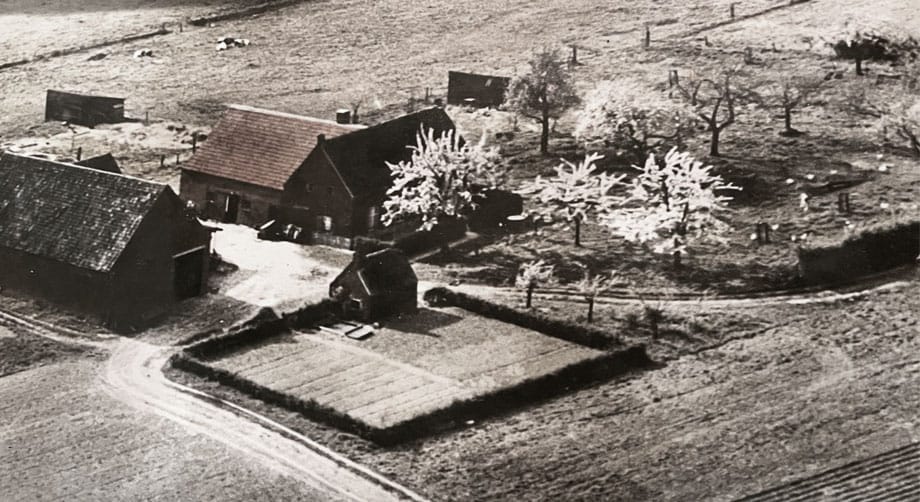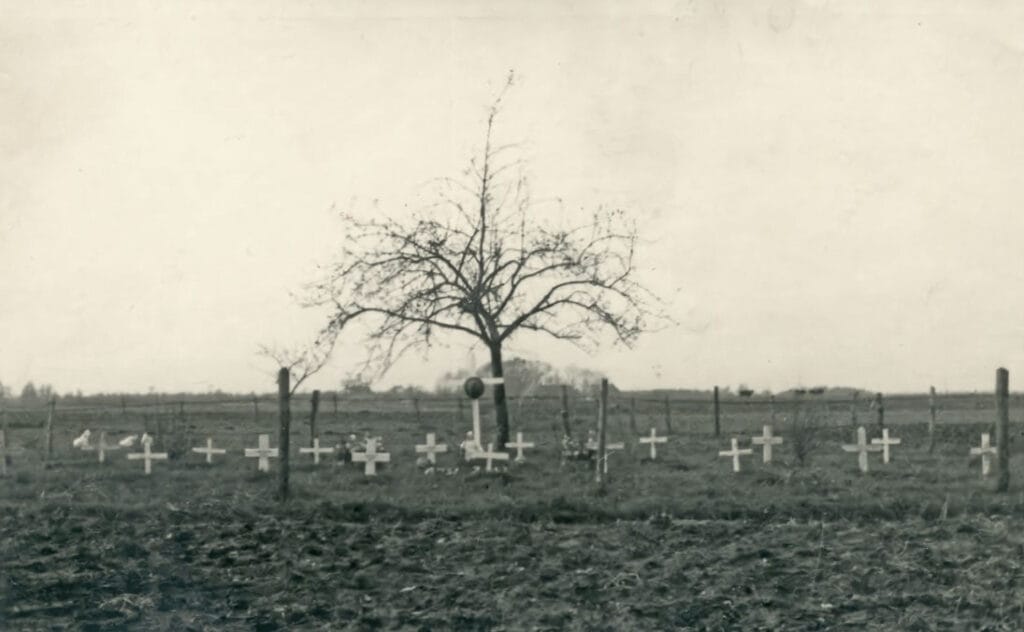Fenn | Edward Charles William
- First names
Edward Charles William
- Age
19
- Date of birth
13-12-1924
- Date of death
19-10-1944
- Service number
14578744
- Rank
Lance Corporal
- Regiment
King’s Own Scottish Borderers, 1st Bn.
- Grave number
II. B. 4.


Biography
Edward Fenn was killed in action on 19 October 1944 near Overloon. He was a Lance Corporal in the King’s Own Scottish Borderers, 1st Battalion (Service number 14578744). He was initially buried at Cemetery A. vd Wijst in Overloon and reburied on 13 May 1947 in grave II.B.4. at the CWG Cemetery in Overloon. The inscription on his gravestone reads: “Sleep on, son, And take thy rest, We love thee well, but Jesus loves thee best”.
Family background
Edward, known as Ted, was born on 13 December 1924 in Lewisham, the son of Charles Edward Fenn and Lily, née Horne. Ted’s parents were both from the London area and all their children were born in Lewisham, a district of London.
Ted had two older brothers, Ronald (1920–2016) and Cyril, born in 1922, but unfortunately Cyril died at a young age in 1923, a year before Ted was born. Charles and Lily had five more children: Gordon (1927–1944), Shelia (1929–2008), Maureen (1932–2013), Mavis (1940–2019) and finally Francesca (1946), who was born two years after Ted’s death.
He grew up in Lewisham, like his brothers and sisters, and attended Hithergreen School. In 1939, he, his father and his brother Ronald worked at Woolwich Arsenal, where explosives were manufactured.
Ted was enlisted in the East Surrey Regiment on 1 December 1943 and was eventually promoted to corporal. On 24 July 1944, he was transferred to the Kings Own Scottish Borderers.
Memories of Ted by Frankie (Francesca)
“My brother grew into a fine young man and always well groomed. He had sandy coloured hair, brown eyes and was about 5 foot 5 inches in height and slightly stocky. He was known to have a temper. He dressed well for social events and, like his brothers, wore a hat.
Ted used use to play the piano he also had his own piano which my parents kept until they both passed. My parents also kept a bugle that also belong to Ted. From the stories I was told, his other passion was running and he won medals and use to run at White City London .How good he was, I do not know.
Ted was also a Religious man but I don’t know how strong his faith was, I can only say that he did carry on his person artefacts of his faith and some of these items were taken from his body after he was killed. To this day I still have two crosses that used to belong to him. Ted was Church of England. He grew up with parents who were Church of England and Roman Catholic. We were left to find our own ways into our faith.
Ted apparently did get engaged and after his death his fiancé was very upset to the point she kept going to my mother. My mother apparently told her to go away and get on with her life there isn’t anything she can do. To understand my mother I must explain. On the 31st July 1944, Ted’s youngest brother, Gordon, got killed at the age of 17 years old. He was only a month into his 17th year. He was working on Lewisham market, my parents were market people so we all come from a very hard working background. Before going in to service Ted also use to help my parents on the market he worked along side my mother.
On 28th July, 1944 a bomb hit Mark & Spencer causing a great death toll to the market and this included my brother. It took three days for my parents to find my brother just in time before he died. Ted was given leave to return home on compassionate leave to be with my parents.
If I am correct Ted was arrested for drinking under the age of 21 years old and had to go to court to which he was given a dressing down and told to pay a fine for under age drinking . His reply to the judge was, I am not old enough to drink but old enough to go and fight for my country and get killed. He never paid the fine, thrown out of court.
He was to return back to his regiment but missed his boat. From what I was told the information is recorded at Edinburgh castle. He return back to Holland end of August. Then by the 19 October he was then killed by enemy action.
So you see for my parents to lose two young sons and their eldest son was with his regiment out in Egypt it was to hard for mother to have the strength to console anyone else.
I have a letter that was sent to my parents by a friend who was serving with Ted in the same regiment when he got killed and there was also a small verse found in Ted’s pack.”
Letter from Reuben Smith about the circumstances around Ted’s death
“Dear Mr Fenn
By the time you get this letter, you probably would have heard about the death of your loving son .
I have known Ted now since last March and I want you to know that I always found him a good and honest pal. I also have spent many a good time with him and he took me to his home once when four of us was on a driving course. I never had the pleasure of meeting you, but I saw Mrs Fenn, she will probably know me as I was the bloke with the curly hair and freckles and with us was our other pale a small chap by the name of Bill Carter who was wounded the same time as Ted was killed.
We three have been together ever since then, we have laughed together, fought together, and always shared our kits together. We three almost became one united to do our duty with a smile, and when it is all over, over here we had plans of having a good time together and now this unlucky blow fell, one killed, one wounded and one left to fight on with a lump in my throat, unhappy and mad with rage at the thought of all the sorrow that the God forsaken Germans have brought on this World, and for what they have done I swore that I shall not for give not one of them as long as I live. I am writing this because I want you to know how Ted died, so please don’t show this to Mrs Fenn or it may make her cry as I am about to tell everything that happened.
We were fighting the Germans in a very large forest and managed to drive them from it out into the open country so our company stayed at that for a rest. So the Germans were out into the open on a railway bank and we were in the forest. On the end of the forest facing the Germans was a farm yard and in there was the platoon which Ted was in.
On the morning of the 19 Oct at 10 o’clock Ted was ordered to take a patrol from the farm yard to a certain spot out in the open, in which he started to do as he gets well into the open he saw a gang of Germans coming towards him, and he at once told his men to get down a keep still as he was going to wait until the Germans where near and then try and take them all prisoners, well, everything was going fine and when the Germans got near, then things became to happen, one of the men lost his nerve and jumped up and ran away, it was then that panic broke out among the men and one more man ran away leaving Ted with two men, and three men against a gang of Germans was hope-less and there fore there was only one thing to do every man for himself, and as the three heroes got up two were killed, and Ted was seen running holding his stomach. Meanwhile the first man who ran away was running and falling over trying to get back to the farm house, and a sergeant run out to meet him and as he did, he was shot by a machine gun and killed at once. All the time this was going on our machine gun from the house was firing at the Germans, who at once aimed their gun on to the farm house, it was then Bill, got a bullet in the left arm, and a man standing next to him got hit in the groan.
The first man to run away reached the farm house ok, at that time we who was at H.Q at the time had got the news of what had happened, and straight away a rescue party formed to try and get the dead and wounded in. We managed to get the men from the farm in but as we try’d to get the dead sergeant and Ted in (who we thought was still alive) we was fired on by the Germans, it was then the officer said it was hope-less and we would have to wait until night came. Dark-ness came and out went the rescue party we found the sergeant and brought him in as 3 hours later we made up our minds to have the 3rd attempt to get Ted in and at 10.30 that night we found him, dead.
He was brought back to our H.Q and in the morning as the officer went to get his pay book from his (Ted) pocket it was found that while Ted was laying out in the open the Germans had came and took every-thing he had in his pockets, the only thing they left him with was the cross which was around his neck. I went and had a look at Ted for the last time and as I knelt down beside him, believe Mr Fenn I nearly cry’d, I could not do or say nothing, as I had lost one of the best pals I ever had, to you he was a loving son and to me a pal who I shall never forget. Ted had died like a hero, fighting so that England may be free, and I shall always think of him as a man who died as that others may live. That morning he was taken away and buried with 4 other men and a short service was held over his grave. Ted Fenn was laid to rest on the 20th Oct and I will make it my duty to see that he never died in vain. Back at H.Q , I took his pack to see if there was anything in it to look after so that if God spares me I could bring it to you after the war as I am sure Ted wanted these things to take home to his family.
Here is a list of what we had, 1 bottle of scent, 1 box of powered, and a small ash tray. If I could send them by post I would gladly do so but I am sorry to say the censor will not allow me to, so I will look after them with all my power that I can take them to you after the war mean while if there is anything you want me to do or tell you, please let me know, as I shall be only to pleased to help you in your sad loss as I and a few of my comrades will miss Ted very much and with these few words I must close remaining one of Ted’s best friends.
Always
Reuben Smith
PS That small verse was what Ted had in his pack “
The verse found in Ted’s pack
A Prayer
The Following Prayer was found in the grave of our Lord Jesus Christ in the year 1003 and was sent from the Pope of the Emperor Charles as he was going into the battle field for safety who ever shall repeat it every day or keep it about them shall never die a sudden death nor he drowned, or fall into the hands of the enemies in battle, nor shall poison take any effect on them, and in seeing red to anyone in great pain they shall have instant release and if you see anyone in sits may this at his or her right side and they shall stand up and he be blessed and they who shall repeat it in any house shall be blessed by the Lord and he that shall laugh at it shall suffer, believe this to be certain it is time as the Holy Evangelist has written it. They who shall keep it always about shall not hear thunder no lightening and they who shall repeat it everyday shall receive three days warning before their death.
The Prayer
Oh; Adorable Lord and Savior Jesus Christ dying on the gallows to save me
Oh; Holy Cross of Christ ward from me all dangerous death and give me lite always
Oh; Holy Cross of Christ ward off from me all things that are evil
Oh ; Holy Cross of Christ protect me from the hands of my enemies
Oh ; Blessed Mother of God interale for us poor sinners of men .
In Honour of his Glorious Resurrection and in honour of his Scared Passion and God take ascent to which he wish to bring us the right asad to Heaven .
Save as Christ was born on Xmas day
Save as Christ died to save sinners
Save as the three wise men brought to Jesus on the Thirteenth day .
Save as he ascended into Heaven
So the Honour of Jesus will save me from my enemies visible and invisible .
Now and ever more Amen
Nothing between me and God
God between me and everything
King’s Own Scottish Borderers, 1st Bn. and the battle of Overloon
Edward Fenn joined the regiment on 24 July 1944 but was granted leave shortly afterwards to return home following the death of his brother Gordon, who died as a result of a bombing raid in England.
At the end of August, he returned to the battalion, which was then stationed in northern France after the D-Day landings in Normandy. They played a role in Operation Goodwood in July, as part of the larger Battle of Caen.
The battalion saw action on 9 August at Vire, but was held in reserve during the attacks on Tinchebray. From 20 August to 3 September, they underwent a period of training. From 5 to 16 September, they were in Etrepangy, where they rested again and received another 30 men as reinforcements, in addition to the six officers and 91 men they had already received since D-Day.
They then moved quickly via Brussels and Leuven to support the 2nd Battalion of the Royal Ulster Rifles and the 2nd Battalion of the Lincolnshire Regiment in crossing the Meuse-Scheldt Canal and continuing on to Belgium and the Netherlands, where they reached Milheeze on 28 September.
At this point, the war diary mentions that the bath unit arrived and ‘the entire battalion felt clean for the first time since Etrepagny,’ which was more than three weeks earlier. On 1 October, they reached St Hubert, where they were very well received by the inhabitants. They remained there until 12 October. They spent their time training, but also had time for relaxation.
A football match was organised against the 6th battalion of the regiment on the football field in St Hubert. They lost 4-1 and the Pipe Band played during half-time and after the match. On 10 and 11 October, there were also two film screenings. The diary states that on 12 October, after a pleasant stay of ten days, they left St Hubert.
On 12 October, they reached a staging area just west of Sint Anthonis. That day, the 1st Suffolks managed to capture Overloon and take up a position just south of the town. The next day, the 1st KOSB attacked the forest southwest of Overloon and reached the southern edge of the forest, although it came under fire when it arrived there. They remained there the next day, while the Royal Ulster Regiment and the Lincolns attacked the forest further to the east.
On the 15th, they moved slightly further south and on the 16th they continued their advance south, expecting to remain there that night. Instead, they were ordered to relieve the 4th Battalion King’s Shropshire Light Infantry east of Overloon in the area near Smakt, with the companies forming up in a north-south direction west of the railway line. They did not take up their positions until 7.30 p.m., in very heavy rain, which meant that the reconnaissance units could hardly see their positions before dark. On 17 October, the war diary mentions that the battalion suffered the heaviest shelling with grenades and mortars to date. They spent their time patrolling the area west of the railway line and keeping an eye on enemy positions. The heavy shelling continued on 18 and 19 October. On the 19th, the war diary mentions successes in combating enemy activities by means of artillery fire. On the 19th, the war diary mentions successes in combating enemy activities by means of artillery fire and establishing an Observation Post in a farm called “Hoeve de Knol”. However, this was the day that, very near to this farm, Edward Fenn was killed. Three of his comrades also lost their lives, as we can read in Reuben Smith’s letter.
The sergeant mentioned in Reuben’s letter was most likely Sergeant Thomas Wilson, and the two comrades who remained behind with Edward in the field and were killed were most likely William Cluett and Percy Chambers.
The graves concentration reports of these servicemen support this theory.
They were buried in a field grave at Begraafplaats A. vd Wijst in Overloon and later, close to each other, reburied on 13 May 1947 at Overloon War Cemetery.
It could be that the fifth soldier Reuben refers to who was buried with them was Leslie Jospeh Shortland, who also died in the same area on the same day and was also buried at the same cemetery, A. vd Wijst.


Sources and credits
General Records Office, FreeBMD, Ancestry.co.uk
Frankie Day, Edwards’ younger sister for the photos, her memories and the letter from Reuben Smith
This biography was compiled by our Foundation based on our own research and stories from other soldiers who served in the same regiment or participated in the same battle on that day. Part of the collective work within the Foundation was used for this purpose.
Research Jane Hope



